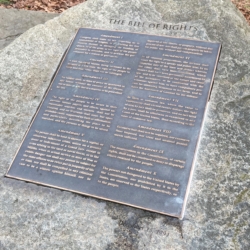| Translation (Aramaic) | Translation (Hebrew) | Source (English) | Translation (Yiddish) | Translation (Arabic) |
|---|---|---|---|---|
לָא־תֵּיזִיל קֳדָמַי דִּילְמָא לָא־אֱזִיל בָּתְרָךְ |
אַל תֵּלֵךְ לְפָנַי, כִּי אוּלַי לֹא אֶצְעַד אַחֲרֶיךָ. |
Don’t walk in front of me — I may not follow. |
גײ ניט פֿאַר מיר אפשר װעל איך נישט מיטגײן. |
لا تمشي ورائي. أنا لا أقود. |
לָא־תֵּיזִיל בַּתְרַי דִּילְמָא לָא־אֱדַבַּר |
אַל תֵּלֵךְ מֵאֲחוֹרַי, כִּי אוּלַי לֹא אֵדַע לְהוֹבִיל. |
Don’t walk behind me — I may not lead. |
גײ ניט הינטער מיר אפשר װעל איך נישט צעפֿירן. |
لا تمشي أمامي. أنا لا أتبع. |
בְּרַם זִיל עִמִּי וַהֲוִי־לִי לִרְחִימִי |
לֵךְ פָּשׁוּט לְצִדִּי, וֶהֱיֵה יְדִידִי |
Just walk beside me and be my friend |
נאָר גײ לעבן מיר און זײַ מײַן חָבֵר |
امشي بجانبي وكن صديقي |
וְכַּחֲדָא נֵיזִיל בְּאׇרְחֵיהּ דְרַחֲמָנָא׃ |
וְיַחַד נֵלֵךְ בְּדֶרֶךְ ה׳. |
And together we will walk in the way(s) of Hashem.[1] This line added in the rendition recorded by Moshe Tanenbaum/Uncle Moishy. It’s important I think to note that “walking in the ways of Hashem” is synonymous with the theological concept commonly referred to as imitati dei, expressed in the Torah as acting deliberately with kindness and compassion. For a good overview of this idea, find Alan Brill’s interview with Shai Held (2017). A short sourcetext for Shai Held’s lecture on this topic (beginning with Deuteronomy 11:22) is available here. |
און צוזאַמען װעלן מיר גײן אױפֿן דֶרֶךְ־ה׳. |
وسنسير معًا في طريق الله. |
וּתְרַחֵם לְחַבְרָךְ כְּוָתָךְ [אֲמַר רַבִּי עֲקִיבָא] הַאי הוּא כְּלָלָא רַבָּא דְּאוֹרַיתָא |
וְאָהַבְתָּ לְרֵעֲךָ כָּמוֹךָ — [אָמַר רַבִּי עֲקִיבָא] זֶה כְּלָל גָּדוֹל בַּתּוֹרָה׃ (רש״י על ויקרא יט:יח:ב) |
Love your fellow as yourself — [Rabbi Aqiva teaches:] this is the fundamental principle of the Torah.[2] A plain reading of Leviticus 19:18 might suggest a more limited application of the principle, as to only refer to fellow Israelites. In Rabbinic thought, the universal expression of this teaching is attested in Bereshit Rabbah 24.7, where the statement of Rabbi Aqiva (ca. 50-135 CE) is understood in relation to the opinion of Shimon ben Azzai (fl. early 2nd c. CE). According to ben Azzai, the fundamental principle of the Torah is found in Genesis 5:1-3, “This is the book of the progeny of Adam. In the day that Elohim created Adam, bidmut Elohim — in the likeness of Elohim — he was made.” (בֶּן עֲזַאי אוֹמֵר :זֶה סֵפֶר תּוֹלְדֹת אָדָם, זֶה כְּלַל גָּדוֹל בַּתּוֹרָה (בראשית ה:א-ג)). This is all part of a midrash on the word מֵאָדָם (méadam) as it appears in Isaiah 44:11, concerning those craftsmen who craft idealizations of human forms for the purpose of idol worship. The midrash expands on the verse by reading mé-adam as “from Adam” haRishon, the first human. In contradistinction to such idol makers, the Divine Creator is the primary crafter of the original earthling, and to disparage his progeny is, according to the teaching of Rebbi Tanḥuma, to disgrace the divine likeness (and thereby, to insult the Creator). Also find, Sifra Qedoshim 4.12 and Jerusalem Talmud Nedarim 9.4.1. (Rashi on Leviticus 19:18.2) |
זאָלסט ליב האָבן דײַן חָבֵר אַזוי װי זיך אַלײן [רבי עקיבא לערנט] דאָס איז דער יְסוֹד פון דער תּוֹרָה. |
بَلْ تُحِبُّ قَرِيبَكَ كَنَفْسِكَ [يعلم الحاخام عكيفا:] هذا هو المبدأ الأساسي للتوراة. |
לָא יִטוֹל עַם בְּאַפֵּי עַם זְיַן וְלָא יִתְאַלְפוּן עוֹד מִבְּכֵן קְרָבָא: |
לֹא־יִשָּׂא גוֹי אֶל־גּוֹי חֶרֶב וְלֹא־יִלְמְדוּ עוֹד מִלְחָמָה׃ (ישעיה ב:ד חלק) |
Nation shall not lift up sword against nation, Neither shall they learn war any more. (Isaiah 2:4 part) |
אַ פֿאָלק קעגן אַ פֿאָלק װעט ניט איופהײבן אַ שװערד, און מען וועט קיין מלחמה מער נישט לערנען. |
لاَ تَرْفَعُ أُمَّةٌ عَلَى أُمَّةٍ سَيْفاً وَ لاَ يَتَعَلَّمُونَ الْحَرْبَ فِي مَا بَعْدُ. |
Variations of the original three lines culminating with “…walk beside me…” first appear in high school yearbooks beginning in 1970. The earliest recorded mention we could find was in The Northern Light, the 1970 yearbook of North Attleboro High School, Massachusetts. The unattributed quote appears at the very start of the front matter (before another unattributed quote — by Benjamin Disraeli) and a dedication to Robert Leslie Guthrie (1943-2022), a beloved teacher and coach who had graduated the high school less than a decade earlier. The use of the quote in the context of counseling in high schools is attested in an article, “Just Be My Friend” by Dr. William F. Knox in his column “Living, Today” (Quincy Sun, 2 December 1971), p. 11. Attesting to the variations in wording and arrangement in circulation, I also found a version handwritten in a 1971 reprint of Mabel Collins’ Light on the Path (1889). (The copy containing this note is held in the collection of the University of Illinois Urbana-Champaign.)
As a quote, the lines have been popularly misattributed to Albert Camus (1913-1960). The misattribution, which begins circulating as early as 1971, is possibly explained by a robust effort of legend weaving by Christian missionaries eager to bring the famous existentialist and Atheist closer to their religious movement. The correct attribution will likely be found somewhere in the 1950s or 60s. The line “Lead me, guide me, walk beside me” is found in a popular hymn of the Church of Latter Day Saints written in 1957 by Naomi W. Randall. In 1964, NBC produced a TV movie on the life of the Christian apostle Paul, “Walk Beside Me.” From the mid-1960s through 1970, the poet Ben Boroughs invoked the phrase “walk beside me” in at least five of his prayer-poems disseminated via his popular syndicated newspaper column “Sketches.” The heavyweight boxer, Mohammed Ali, was also quoted in 1965 joking before a fight in Poland Spring, Maine, that he was being treated there “better than home. Police here walk beside me instead of behind me.”[3] ”Challenger Set for [Cassius] Clay Tuesday” in The New York Times, 22 May 1965, page 23.
In the Jewish world of the early to mid-1970s, a young Moshe Tanenbaum began transmitting the lines at Jewish summer camps. (There is no record of the song being sung in Jewish schools or summer camps before this era. While not entirely certain, he thinks he may have first picked up the lines while working at the Bathurst Street Y Day Camp in Toronto.) In 1979, as Uncle Moishy, Tanenbaum published a recording of the song under the title “v’Ohavta” (track A4 on The Adventures of Uncle Moishy and the Mitzvah Men, volume 2).
The origin of the Hebrew translation is likewise difficult to track down. The one appearing here was the most common in my searches (again, misattributed to אלבר קאמי). Besides adding niqud and the Hebrew text of RASHI on Leviticus 19:18, I have provided a Hebrew translation for “and together we will walk in the way of Hashem,” the novel line in its Jewish context. Popularly, the latter portion of Isaiah 2:4 is appended. The earliest date we have heard of it’s inclusion is in 1987 at a summer camp in Ontario. (Thanks to Aurora Mendelsohn for this detail.)
Just in case it may also do some good in these difficult times, I am also adding translations in Yiddish and Arabic. The Yiddish translation is entirely new, except for Yehoyesh Blumgarten’s translation of Leviticus 19:18. The Arabic translation is a combination of the original three lines as found in Arabic here, with Leviticus 19:18 as found in the Arabic Bible (SVD). (Many thanks to Isaac Gantwerk Mayer, Eliran Sobel, and Baruch Jean Thaler for reviewing and improving my Yiddish here.) Isaac Gantwerk Mayer contributed the translation in Aramaic. The translation of Isaiah 2:4 is from the JPS 1917. The Aramaic translation of Isaiah 2:4 is from Targum Yonatan. –Aharon Varady
Recording(s)
Source(s)


Notes
| 1 | This line added in the rendition recorded by Moshe Tanenbaum/Uncle Moishy. It’s important I think to note that “walking in the ways of Hashem” is synonymous with the theological concept commonly referred to as imitati dei, expressed in the Torah as acting deliberately with kindness and compassion. For a good overview of this idea, find Alan Brill’s interview with Shai Held (2017). A short sourcetext for Shai Held’s lecture on this topic (beginning with Deuteronomy 11:22) is available here. |
|---|---|
| 2 | A plain reading of Leviticus 19:18 might suggest a more limited application of the principle, as to only refer to fellow Israelites. In Rabbinic thought, the universal expression of this teaching is attested in Bereshit Rabbah 24.7, where the statement of Rabbi Aqiva (ca. 50-135 CE) is understood in relation to the opinion of Shimon ben Azzai (fl. early 2nd c. CE). According to ben Azzai, the fundamental principle of the Torah is found in Genesis 5:1-3, “This is the book of the progeny of Adam. In the day that Elohim created Adam, bidmut Elohim — in the likeness of Elohim — he was made.” (בֶּן עֲזַאי אוֹמֵר :זֶה סֵפֶר תּוֹלְדֹת אָדָם, זֶה כְּלַל גָּדוֹל בַּתּוֹרָה (בראשית ה:א-ג)). This is all part of a midrash on the word מֵאָדָם (méadam) as it appears in Isaiah 44:11, concerning those craftsmen who craft idealizations of human forms for the purpose of idol worship. The midrash expands on the verse by reading mé-adam as “from Adam” haRishon, the first human. In contradistinction to such idol makers, the Divine Creator is the primary crafter of the original earthling, and to disparage his progeny is, according to the teaching of Rebbi Tanḥuma, to disgrace the divine likeness (and thereby, to insult the Creator). Also find, Sifra Qedoshim 4.12 and Jerusalem Talmud Nedarim 9.4.1. |
| 3 | ”Challenger Set for [Cassius] Clay Tuesday” in The New York Times, 22 May 1965, page 23. |

““Just Walk Beside Me” (לֵךְ פָּשׁוּט לְצִדִּי | امشي بجانبي | נאָר גיין לעבן מיר), lines from an unknown author circulating in 1970; Jewish adaptation with translations in Aramaic, Hebrew, Yiddish, and Arabic” is shared through the Open Siddur Project with a Creative Commons Attribution-ShareAlike 4.0 International copyleft license.










Leave a Reply